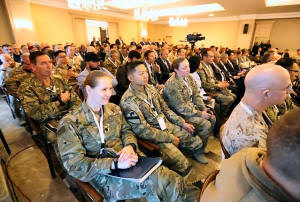|
Exclusive: Facing Trump's demands, NATO
to consider larger Iraq training mission
 Send a link to a friend
Send a link to a friend
 [February 07, 2018]
By Robin Emmott [February 07, 2018]
By Robin Emmott
BRUSSELS (Reuters) - The United States is
renewing pressure on its European NATO allies to establish a long-term
train-and-advise mission in Iraq, diplomats said, reviving a divisive
issue for an alliance wary after a decade in Afghanistan.
U.S. Secretary of Defense Jim Mattis sent a letter to NATO headquarters
in January calling for a formal NATO mission to Iraq with a
semi-permanent or permanent command to train Iraqi forces, according to
five senior NATO diplomats.
After a three-year war with Islamic State, Washington wants to ensure
the militants do not re-emerge. While NATO does have trainers in Iraq
already, they number less than 20. NATO defense ministers are expected
to discuss the U.S. request in Brussels next week, with a possible
decision at a summit in July.
In his letter, Mattis left many details open but suggested developing
military academies and a military doctrine for the Iraqi defense
ministry, diplomats said. Other ideas cited by diplomats include bomb
disposal training, maintenance of Soviet-era vehicles and medical
training.

"The United States is pushing hard for a NATO role in Iraq, not in a
combat role, but for a long-term assignment," said one senior NATO
diplomat on condition of anonymity.
"This looks suspiciously like another Afghanistan," the diplomat said,
referring to the long-running conflict where NATO is funding and
training Afghan forces. "Few allies want that."
Pentagon spokesman Johnny Michael declined to discuss whether Mattis had
sent a letter to NATO but said: "The administration continues to look
for ways allies can do more to counter terrorist organizations."
A NATO official said that the alliance is "looking into how we can
step-up our training efforts".
NATO defense chiefs will provide ministers with a range of options for
an Iraq mission, while NATO Secretary-General Jens Stoltenberg has
discussed the issue with Prime Minister Haider al-Abadi, who supports a
mission, diplomats said.
The U.S. push is also part of President Donald Trump's demand that the
Western alliance go beyond its core task of defending its territory and
help stem Islamic militancy.
Trump scolded allies last May at a summit in Brussels, warning of more
attacks in Europe if NATO did not do more to stop militants. Even his
predecessor Barack Obama sought a greater NATO role in the Middle East.
Then, U.S. officials had raised the possibility of NATO taking over the
running of the U.S.-led coalition against Islamic State, as it did of
the U.S.-led mission in Afghanistan in 2003.
[to top of second column]
|

U.S. Army members and multinational officials attend the third
annual international conference on countering Islamic State
propaganda in Baghdad, Iraq December 13, 2017. REUTERS/Thaier
Al-Sudani

The United States sees NATO's long experience in Afghanistan as
putting it in an ideal position to help build up Iraqi forces after
recapturing territory taken by Islamic State. The United States has
more than 5,000 troops in Iraq.
But European allies fear being pulled into another open-ended
foreign assignment that is costly, unpopular at home and potentially
dangerous.
In a gesture to Trump, the 29-nation alliance agreed last year to
join the coalition. However, France and Germany insisted that the
decision was mainly symbolic.
IRAQ ELECTION, LETTER
The size of any potential NATO mission has not been debated, but the
diplomats said they would need to be substantially more than the
current team to mollify Trump. They could involve regional training
centers outside Baghdad.
"This is an area where we could demonstrate relevance," a second
diplomat said, noting that allies were well aware of Trump's
campaign criticism in 2016 that NATO was "obsolete" because it did
not do more to combat militants.
Creating a formal NATO mission would mean greater funding, so-called
force generation to drum-up troops and a structure to keep them in
the field for longer.
Difficult issues include whether military trainers would require
protection and who would provide it.
Iraq would need to formally request the NATO mission, diplomats
said. That would likely rely on Abadi winning re-election in May, as
rival candidates backed by Iran are hostile to U.S. troops remaining
in the country.

But the pressure is also greater because NATO has not yet been able
to follow up on a similar train-and-advise request from Libya's
U.N.-backed government in Tripoli, diplomats said, because the
country is still controlled by rival factions.
(Additional reporting by Idrees Ali in Washington; Editing by
Matthew Mpoke Bigg)
[© 2018 Thomson Reuters. All rights
reserved.]
Copyright 2018 Reuters. All rights reserved. This material may not be published,
broadcast, rewritten or redistributed.
Thompson Reuters is solely responsible for this content. |